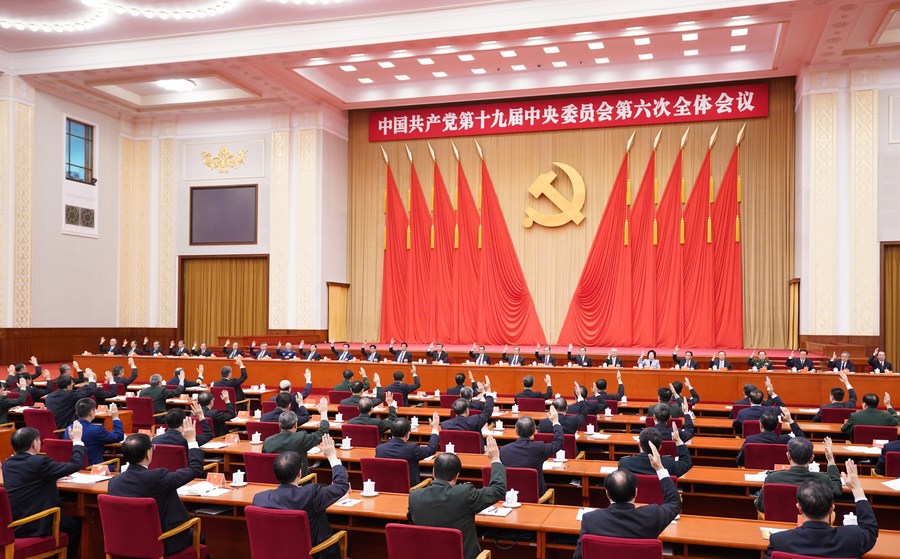Plenary session shows importance of diplomacy


Political rhetoric and bold declarations of policy and principle, like money, have to be credible. They have to be backed by deeds. China's growing standing around the world, irrespective of the US administration's rhetoric and diplomatic efforts and alliance building against it, is backed by real deeds and remarkable achievements.
The hostile tone of some officials in the current US administration, like their predecessors, toward Beijing has still to pass that test, although the meeting between President Xi Jinping and US President Joe Biden, via video link, on Nov 16 is expected to lead to more open and candid dialogue between the two sides to enhance mutual understanding.
China's rise does not necessarily pose a threat to the United States.
But US leaders and policymakers remain blind to the lessons of history. They forget how Germany before World War I thought it needed to destroy a rapidly industrializing Russia when it could have renewed the mutually beneficial friendship forged between Tsar Alexander II and Second Reich founding father Otto von Bismarck.
It seems US leaders have even forgotten how nearly 250 years ago, King George III of Britain and his ministers turned a deaf ear to the calls for more independence and self governance from the American people and instead tried to suppress them. The British government sent armies and fleets thousands of miles across the ocean in a bid to first coerce and then crush the Americans, whose total population was only about 1 million at the time. They failed disastrously.
Those US policymakers who are trying to bully and intimidate China, a country with a population of 1.4 billion and the largest concentration of industries on Earth, should look at their own history and learn the appropriate lessons from it.
Instead of fulminating with empty, worthless rhetoric and false, hysterical charges against the government and policies of China, US leaders and diplomats would do better to read the recently issued resolution of the Sixth Plenary Session of the 19th Communist Party of China Central Committee. For the resolution says that its global vision is one of the 10 factors that helped it to achieve successes over the past century.
How has that global vision been expressed?
Over the past half a century, China has contributed immeasurably to the cause of world peace, and helped raise the living standards of its own people as well as other peoples around the world.
China has never sought to invade or colonize other countries. Instead, it has invested enormous resources in developing food production and crops across Africa and Latin America. In fact, China's infrastructure investment in Africa has surpassed that of the US or major European Union countries. China has also played a central role in easing inflation pressure in the US by exporting vast quantities of goods to the country.
In all these activities, China has set a positive example for the developing world-different from the ideologically driven bombings, military invasions and occupations carried out under increasingly spurious excuses by the US and its NATO allies.
It would be encouraging to believe the conversation between Presidents Biden and Xi on Tuesday, which was candid and non-confrontational in tone, will herald a new era of greatly expanded dialogue and serious, sustained negotiations on serious issues between the two powers.
However, it remains to be seen how much will translate into action and how much will just be lip service. Some top US policymakers, most especially Secretary of State Antony Blinken and National Security Advisor Jake Sullivan, still appear committed to the confrontational policy over the Taiwan question-of massive US naval and air presence in the South China Sea-a policy pursued energetically by their predecessors in the Donald Trump administration.
The lessons of the highly trumpeted US "pivot to Asia" (a simply more stirring way of saying "seeking to confront China") policy has not intruded either the Biden administration or the Democratic Party. Or else, the US administration would not have forged ahead with its latest strategic fantasy-AUKUS, the Australia-UK-US alliance or strategic partnership.
The alliance is already being used to force-feed the Australians with highly expensive US-built strategic weapons systems that they do not need and would at best be irrelevant to their real defense requirements.
Yet a genuine easing of tensions with Beijing and the start of a serious, constructive dialogue recognizing the reality of China's astonishing achievements and peaceful rise are well within reach and could easily be initiated. Long-term settlement of deep differences will not come quickly or easily but they are achievable and long overdue.
That is why the Biden-Xi talk should be welcomed and seen as a modest but hopeful start to a new era when differences between the US and China are recognized and peacefully resolved in the true spirit of diplomacy. The future and well-being of billions of people depend on it.
The views don't necessarily reflect those of China Daily.

If you have a specific expertise, or would like to share your thought about our stories, then send us your writings at [email protected], and [email protected].

































